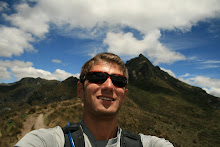
September 20-21 I travel to Tena with the other study abroad students and a group of guys from Casa Gabriel, you can find more information about Casa Gabriel if you click on the link to Youth World. From Quito it is a five hour bus ride, we got to the river about 9:00 a.m. and set up our kayaking gear. It was such a blast kayaking down the rapids. I am looking forward to going there again.
Tena, the capital of the Napo Province, is an attractive and quiet city in the Amazon rainforest. Known as the “cinnamon capital" of Ecuador, and originally founded by missionary explorers, Tena has emerged as one of the top industrialized centers of Ecuador. It is the home to a major regional hospital and many tourist related businesses, including a small airport and a vital bus terminal.
Tena is a popular launching point for jungle, kayaking and rafting tours in Ecuador's Amazon rainforest region. The entry to the city is marked by a statue of the indigenous hero Jumandy, who courageously led an uprising against the Spanish colonizers in 1578, and was subsequently executed.
At the confluence of the Tena and Pano rivers in the center of town lies a popular pedestrian bridge, "el puente peatonal". The rivers become the Tena River, which soon joins with the Misahualli and eventually flows into the Napo River. The Napo winds its way east into Peru and Brazil, and is in effect the 9th largest tributary to the Amazon River.
The town is popular with travelers, since it is known as being peaceful, orderly, clean and more geared towards tourists. Many inexpensive hotels, tourist agencies, and restaurants cater to backpackers who commonly use the town as a jumping-off point for trips into the rainforest. Tena is surrounded by forested hills and is located at the edge of the Andes, which are visible to the west.
Tena and its surrounding indigenous communities are also bases for many volunteers working for reforestation projects, with community support in development initiatives in diverse, and connected areas such as bio-piracy, ecotourism and capacity building. Ecuador has one of the best politically organized indigenous populations in Latin America and Tena houses two major confederations, Fonakin (Federacion de Organisaciones de la Nacionalidades Kichwa de Napo) and Ashin (Association de Shamanes Indigenas de Napo); one of the major stand-offs during the 2001 indigenous uprising in Ecuador, took place here.
In comparison to Puyo, the capital of the neighboring province Pastaza, which is both bigger and growing faster, Tena has a lively night life with bars that cater to foreigners. Friday and Saturday nights crowds of volunteers, guides (both indigenous and foreign), and local young people assemble in the "discotecas" playing reggaeton, salsa, and pop music. One will also find a wide variety of "comidas tipicas", preparing and serving food in the traditional manners of the local peoples.
For a rainforest city, Tena's climate is surprisingly comfortable and cooler than the jungle to the east, due to its elevation at 500m above sea level. There's rainfall year-round, with an annual average of 171.65 inches (4,359.91 mm). The heaviest rains come in April, May, and June, but even in this very wet time it doesn't necessarily rain every day or all day when it does rain. The rain is pleasant and warm, but if you plan to be outside for long periods even warm rain can bring down your body temperature so it's wise to have a raincoat or umbrella.
Most roads in the Oriente are unpaved and subject to landslides and other delays, especially during the rainy season. The road from Quito to Tena is no exception, though it continues to be improved. There is regular bus service to Tena via Baeza, but you should book in advance as the buses fill up fast, particularly on Fridays and Sundays. There is a small airport outside of Tena with commercial flights; small white truck-taxis are abundant in the city. It's a good idea to negotiate your price before getting in because the taxi drivers in Tena, like everywhere else in South America, often overcharge.
Tena is famous for the rainforest and rivers that surround it. The jungle, especially if you get outside the city 15 or 20 kilometers, is impressive. First-timers will be changed forever after they lay their eyes on a pristine stretch of Amazon. There is no shortage of jungle guides or tour operators; many have offices in the center of town on Avenida 15 de Noviembre.
Moreover, Tena has reached near legendary status with whitewater enthusiasts and boasts the best rafting and kayaking in Ecuador and, some say, the world. The Jungle Rivers on the Amazon side of the Andes are bigger and have more consistent flows than their west-Andean counterparts. They are also the cleanest and most scenic rivers in Ecuador.
(Information from Wikipedia)


No comments:
Post a Comment